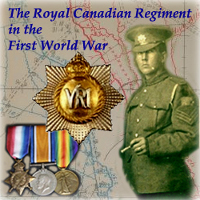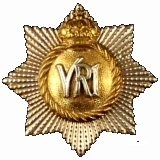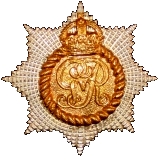
The Royal Canadian Regiment and
The First World War - 1914-1919
"March the Guilty Bastard In"
By: Captain Michael M. O'Leary, orginally published in the regimental journal of The Royal Canadian Regiment, PRO PATRIA 2010
"March the Guilty Bastard In" – an apocryphal announcement reputedly stated by curmudgeonly senior officers presiding over Summary Trials, usually taken to imply that any soldier, having been charged, was certainly guilty of some crime and deserving of punishment, even if not guilty of the charge about to be read.
Having a database of over 17,000 entries from the Regiment's Part II Daily Orders of the First World War provides a rich store of information offering intriguing glimpses of the stories behind some of the Royal Canadians who served between 1914 and 1919. While many soldiers will appear only twice in the Part II Orders, once on arrival in the overseas battalion and once again on departure, others appear with much greater regularity.
One of the searches I conducted in the Part II Orders data after converting it to an easily searched format, was to discover the soldier of the Regiment who appeared most often. The change from Permanent Force (PF) regimental numbers to Canadian Expeditionary Force (CEF) service numbers in late 1915 necessitated two separate searches and a comparison of the highest returns from each search to find the "winner" by aggregate. As it turned out, higher math was unnecessary to confirm the "winner" of this little contest. The same soldier topped the list of recurring appearances both before and after the change of service numbers to the CEF system.
And the soldier who appears most often in the CEF Part II Orders of The RCR is:
20327 / 477809 Pte Ryan, Thomas J
Born 15 Feb 1897 in Newcastle, England, Thomas Ryan was already serving in The Royal Canadian Regiment when he attested for overseas service at Halifax on 21 August 1915. His regimental number indicates a wartime enlistment, but he was not part of the reinforcement draft that joined the Regiment in Bermuda. Ryan transferred from The RCR Depot in Halifax as the Regiment prepared to sail for England in August 1915. Ryan's attestation papers show that he was struck off the strength of the Depot, and was assigned at the end of August to "B" Company.
Thomas Ryan's entries in the Part II Orders include six entries related to postings between companies or units, and two for minor stoppages of pay. But the real reason he appeared so frequently was the 21 separate entries related to his encounters with the military justice system as the centre of attention at 12 summary trials and three Courts Martial.
We may never know exactly how competent a soldier Ryan was at those times when he did serve with his company, but we can certainly tell that he was an incorrigible drinker and absentee. Twelve of his summary trials and courts martial consist of, or include a charge of, "Absence"; and four times his charge sheet read "Drunkenness." It is likely that many of his absences were also accompanied by excesses of liquor.
It should be noted that Ryan was never charged with "Desertion." During the First World War, a careful distinction was held between "Absence" and "Desertion", though it was expressed in military law references in finer terms than any well-versed barrack room lawyer, like Ryan himself perhaps, might have explained to a younger soldier.
Major E.W. Pope, an officer of The RCR, authored "A Practical Guide to the Study of Military Law" in 1917. In that volume Maj Pope provided the following definition for Desertion:
Desertion – The essence of this crime is intention. It must be proved in order to obtain a conviction of desertion that the offender absented himself with either (1) the intention of nor returning to His Majesty's service at all, or (2) to escape a particularly important service such as duty overseas or aid to the civil power. (A.A. Sec. 12; Manual of Military Law, ch. Iii. paras 13, 14,15, 16, 17.)
In practice, it required that a man, having been specifically warned for service in the trenches (or serving there at the time of his departure) was doing so with the intention of avoiding battle. To overstay leave, or to slip away from a camp, billets or other duty, without having been warned for a return to the front, was merely "absence" and not "desertion."
The Manual of Military Law, 1914, states in the referenced paragraph 16 that:
"A man who absents himself in a deliberate or clandestine manner, with the view of shirking some important service though he may intend to return when the evasion of the service is accomplished, is liable to be convicted of desertion just as if as intention never to return had been proved against him."
It is perhaps, in some small way, to Ryan's credit that his charge sheet never read "Desertion."
Periods of imprisonment, detention, confinement to cells while awaiting trial, Field Punishment, and Confinement to Barracks (C.B.) — all of these appear, sometimes repeatedly, in Ryan's Daily Order entries. In total, between Aug 1915 and Feb 1919, he had an accumulation of awarded punishments totaling 1 year, 3 months and 3 weeks. This is equal to almost 40% of his time overseas with the Regiment. Ryan did not, however, serve all of these. Late in the war, a period of Field Punishment was curtailed when he was Court Martialed for escaping before it was complete, following which he began a new punishment of imprisonment.
One of Thomas Ryan's appearances in the Daily Orders coincides with his one and only appearance in the Regiments' War Diary on 17 April 1916. In a less than honourable mention for Ryan, the entry for that date reads:
17-4-16 - Trenches
Weather cloudy and wet. Situation quiet. Wind Mild S.W.
Captains G. DWYER and H.P. BELL and Lieuts. A.S. CHURCHILL and T.F. MORRISON of 40th Battalion reported for duty till instructions are received.
No. 477809 Pte. T. RYAN Wounded in heel G.S. Self-inflicted.
No. 477786 Pte. C. ROBINSON Wounded, G.S.
No. 477950 L/Cpl N.P. VROOM, Wounded, G.S.
Companies interchanged. "B" Company took over from "A" Company and "D" Coy. took over from "C" Coy. in the front line.
Lieut F.R.L. de Salis to duty from Command as Instructor at HAVRE.
No. 477770 Pte C. REYNOLDS, Wounded, Shrapnel, T.63½.
No. 477217 Pte. A. DALE, Wounded.
No. 477827 Cpl. G SHARPLES, Wounded G.S., R.E. Training.
At the time, all Medical Officers were under orders to identify all wounds which were known or suspected to be self-inflicted. When so reported, the soldier was immediate held for Court Martial. At the end of the following month, on 31 May 1916, the results of Thomas Ryan's first Field General Court Martial (F.G.C.M.) was recorded in the Part II Daily Orders:
Part II Daily Order No. 22, dated 31 May 1916
Court Martial; 477809 Pte. Ryan, T.
In arrest awaiting trial 21 Apr 1916. Tried and convicted by F.G.C.M. 8 May 1916 of "When on active service, Neglect to the Prejudice of Good Order and Discipline (Carelessly wounding himself in the Left Foot)" and sentenced to 28 days Field Punishment No. 1. Confirmed by GOC 2nd Army 8 May 1916.
This was not Ryan's first experience with Field Punishment No. 1, having been sentenced earlier that year to a period of 14 days for absence and drunkenness. Under a sentence of Field Punishment No. 1, Ryan would have been kept in irons (which could include rope or other bindings) and could be attached for up to two hours in each day to a fixed object. In addition to this public display of his punishment, he was liable for any assigned work or employment as if he were under a sentence of imprisonment with hard labour.
Ryan's poor disciplinary record continued unabated on his return to the Battalion, and was equally poor during periods away from the unit. One charge parade for Drunkenness was held at No 14 Convalescent Depot, resulting in 14 days Field Punishment No. 2 after being found guilty of charges of "(1) Drunkenness; (2) Absence."
Thomas Ryan would also be tried by Court Martial twice more before the end of the war. The results of these two trials, as recorded in the Part II Daily Orders, are:
Part II Daily Order No. 54, dated 12 June 1918
Court Martial; 477809 Pte. Ryan, T.
In arrest awaiting trial 19 May 1918. Tried and convicted by F.G.C.M. of When on active service, Absent without leave from 9.10 a.m.19 May 1918 till apprehended by the Military Police at Bruay 9.20 p.m. 19 May 1918 and sentenced to 60 days Field Punishment No 1, 28 May 1918. Forfeits 1 days pay by Royal Warrant. Sentence confirmed by G.O.C. 7th Cdn Inf Bde, 28 May 1918.
Part II Daily Order No. 88, dated 16 Aug 1918
Court Martial; 477809 Pte. Ryan, T.
In arrest awaiting trial 18 Jun 1918. Tried and convicted by F.G.C.M. of (1) When on active service, when in confinement, escaping; (2) When on active service absent without leave from 7.30 a.m. 12 Jun 1918 to 1.30 p.m. 18 Jun 1918; (3) When on active service, when in lawful custody attempting to escape. Sentenced to 9 months Imprisonment with Hard Labour, 23 Jul 1918. Forfeits 7 days pay by Royal Warrant. Sentence confirmed by G.O.C. 7th Cdn Inf Bde, 26 Jul 1918.
On 13 Sep 1918, following his third Court Martial, Thomas Ryan was committed to prison to serve out a sentence of nine months Imprisonment with Hard Labour at No. 2 Military Prison. His final appearance in the Regiment's Daily Orders came on 6 Feb 1919, when he was Struck off Strength on transfer to the Canadian Record List which would be responsible for his further administration as the Regiment returned to Canada for demobilization.
Thomas Ryan was, according to existing records, the Regiment's most incorrigible soldier during the First World War. If he had been a Permanent Force soldier before or after the War, he would not have been re-engaged if he had made it to the end of a typical three-year engagement period. Today, his repeated offences would lead to both disciplinary and administrative measures, quite likely ending with his release. His case does demonstrate the Regiment's readiness to retain a disciplinary problem rather than pass him off to another unit or Corps, and he was probably a favourite choice of a few Sergeants Major when unpopular tasks were being assigned.
Pro Patria
- The O'Leary Collection; Medals of The Royal Canadian Regiment.
- Researching Canadian Soldiers of the First World War
- Researching The Royal Canadian Regiment
- The RCR in the First World War
- Badges of The RCR
- The Senior Subaltern
- The Minute Book (blog)
- Rogue Papers
- Tactical Primers
- The Regimental Library
- Battle Honours
- Perpetuation of the CEF
- A Miscellany
- Quotes
- The Frontenac Times
- Site Map

![]() The RCR in the Great War
The RCR in the Great War
![]() War Diary
War Diary
![]() Battle Honours
Battle Honours
![]() Battle Bars and The RCR
Battle Bars and The RCR
![]() The RCR Battle Bar Ledger (pdf)
The RCR Battle Bar Ledger (pdf)
![]() Honours and Awards
Honours and Awards
![]() Roll of Honour
Roll of Honour
![]() Prisoners of War
Prisoners of War
![]() Cemetery List
Cemetery List
![]() Cemetery Map
Cemetery Map
![]() Courts Martial
Courts Martial
![]() Officers
Officers
![]() RSMs of The RCR (1914-1919)
RSMs of The RCR (1914-1919)
![]() NCOs and Soldiers
NCOs and Soldiers
![]() An Officer's Diary (1914-1918)
An Officer's Diary (1914-1918)
![]() Recollections of a Nonagenerian (R. England) (1916-1919)
Recollections of a Nonagenerian (R. England) (1916-1919)
![]() On to Bermuda (1914-15)
On to Bermuda (1914-15)
![]() England and France 1915-1916 (Hayes; 1931)
England and France 1915-1916 (Hayes; 1931)
![]() Overseas with The Royals (1915)
Overseas with The Royals (1915)
![]() Regimental History Pamphlet (1917)
Regimental History Pamphlet (1917)
![]() Amiens (1918)
Amiens (1918)
![]() Cambrai (1918)
Cambrai (1918)
![]() Monchy-le-Preux (1918)
Monchy-le-Preux (1918)
![]() Under-aged Soldiers in The RCR
Under-aged Soldiers in The RCR
![]() Not All Were Volunteers; The RCR and the Military Service Act
Not All Were Volunteers; The RCR and the Military Service Act
![]() Sentenced to Death by Court Martial
Sentenced to Death by Court Martial
![]() The 7th Trench Mortar Battery
The 7th Trench Mortar Battery
![]() A Regimental Goat
A Regimental Goat
![]() Regiment and Family, Bermuda 1914-15
Regiment and Family, Bermuda 1914-15
![]() "March the Guilty Bastard In"
"March the Guilty Bastard In"
![]() Surrendered as Stowaway
Surrendered as Stowaway
![]() Re-Visiting the Great War Roll of Honour for The RCR
Re-Visiting the Great War Roll of Honour for The RCR
![]() Canadian Corps Trench Standing Orders (1916)
Canadian Corps Trench Standing Orders (1916)

